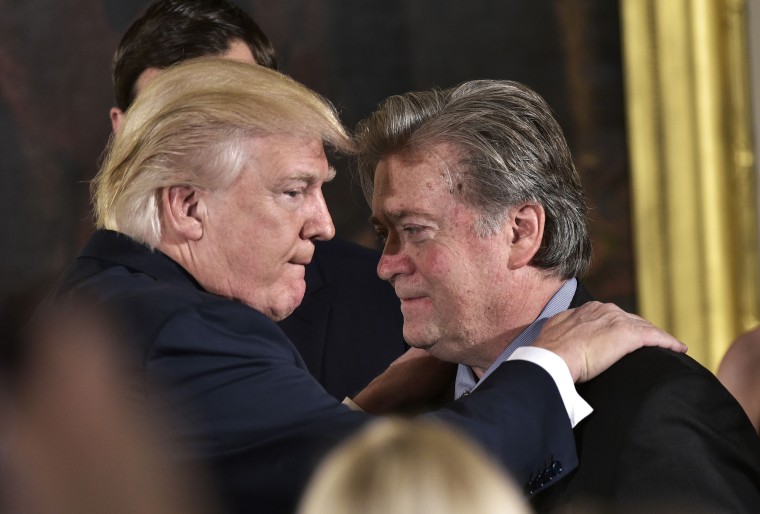Not long after Stephen Bannon was indicted as part of an allegedly fraudulent wall-building scheme, Donald Trump was asked for his reaction. True to form, the president pretended to barely know his former chief strategist -- a go-to move Trump has relied on throughout his presidency.
The president also feigned ignorance about the We Build The Wall venture, which is a claim that's very difficult to take seriously for a variety of reasons.
At the same White House event today, NBC News' Geoff Bennett followed up with the right question.
"Respectfully, sir, it's not just Steve Bannon. It's Roger Stone, it's Michael Flynn, it's Rick Gates, Paul Manafort, Michael Cohen. What's that say about your judgment that these are the kind of people who you affiliated with, and the culture of lawlessness around people who were involved in the leadership of your 2016 campaign?"
Trump began by saying, he "had no idea" -- about what, he did not specify -- before adding, "There was great lawlessness in the Obama administration. They spied on our campaign illegally."
At this point, we could note that the Obama administration was a modern marvel for scandal-free governance. We could also reemphasize that no one spied on the Trump campaign. While we're at it, we could note how pitiful it is to see the president peddle whataboutism when he can't think of anything credible to say.
But in this instance, the forest is vastly more interesting than the trees.
In recent years, Donald Trump's personal attorney (Michael Cohen) was charged and convicted. His White House national security advisor (Michael Flynn) was charged and convicted. His campaign chairman (Paul Manafort) was charged and convicted. His deputy campaign chairman (Rick Gates) was charged and convicted. Two of his former campaign advisers (Roger Stone and George Papadopoulos) were both charged and convicted.
And these are just the top-line indictments, and don't include others in Trump's orbit, including folks like Corey Lewandowski, who've faced charges.
Ten months ago, the Washington Post highlighted "the remarkable universe of criminality surrounding President Trump," and that was before the list grew longer.
Circling back to our earlier coverage, the number of criminals is important, but so too is the degree to which this dynamic conflicts with the message Trump has been eager to trumpet. As regular readers know, the president presents himself as being aggressively "tough on crime." which he frequently tries to incorporate into his agenda. Last year, for example, while making the case for a border wall, the Republican declared, "The Democrats, which I've been saying all along, they don't give a damn about crime. They don't care about crime.... But I care about crime."
Of course, given recent events, it's hardly unreasonable to wonder whether he cares about crime or about surrounding himself with people who've committed crimes?
The president's newest campaign manager, Bill Stepien, recently argued, "I think you need to judge Joe Biden by the people he's surrounding himself with." I'm curious whether he'd encourage voters to also judge Donald Trump by the criminals he's surrounded himself with.
